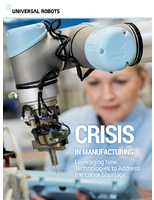Bosch Direct Drive Technology Gives Major Boost to Delta Robot Speed
o Entry-level Delta robot cell Paloma D2 1R features highly compact frame
o Easy cleaning, fast changeovers and high efficiency
o Gemini 3.0 software simulates the production process in 3D
Bosch Packaging Technology will showcase its Direct Drive Delta robot DD23 at Interpack 2011, in Düsseldorf. This new development enables a 50 percent speed increase of Delta robots. The DD23 robot is the first Delta robot to have directly servo driven arms. They are mounted directly on the motor, which eliminates the need to have gearboxes or a rack and pinion construction. This reduces maintenance, which leads to less downtime and an increase in the overall equipment efficiency. The DD23 robot can utilize the complete portfolio of end-effectors, ranging from mono- and multipick to reflex pick end-effectors. Vaccuum, mechanical and Coanda end-effectors, with or without rotations, ensure gentle and reliable product handling. The lightweight material and design enable high performance packaging applications. "More than twenty years after introducing the Delta robot to the packaging industry Bosch Packaging Technology once again introduces a milestone in Delta robot technology, underlining the company's market leadership.", said Daniela Thiele, Director Product Management and Marketing at Bosch Packaging Technology. Bosch's great expertise in this area stretches from end-effectors to robots and from software to machine cells, with over 2.000 robots successfully installed worldwide in a variety of packaging applications.
At Interpack 2011 in hall 6, stand B09-C58, the DD23 will be incorporated with the new Paloma D2 1R. This new Paloma entry-level automation solution with a compact frame has been especially designed to fit a single robot. The robot picks a single product or a group of products, either food or non-food items, and top loads them into various types of cartons and trays. The robot can also directly feed the products into infeed chains of packaging machines, such as horizontal wrappers or side load cartoners.
The Paloma D2 1R can easily be combined with other machines into a complete line, which allows manufacturers to conveniently adapt to constantly changing production needs. The stainless steel frame and open machine design meet regulations and requirements for safe food handling. Product residues are avoided and fast and easy cleaning is enabled, contributing to maximum uptime. Uptime is further being enhanced by the tool-less change of end-effectors, which can be performed in less than two minutes.
The Gemini 3.0 software allows the simulation of the machine and its processes on the machine's touch screen. This virtual machine eliminates the need to have physical products available, reducing product waste and shortening set-up time. This also shortens installation times and increases efficiency. A 3-D view enables operators to adjust and optimize pick-and-place patterns and other settings for each product in an intuitive manner. Together, the Paloma D2 1R and Gemini 3.0 software increasingly reduce downtime during changeovers, significantly impacting overall production efficiency.
Contact:
Daniela Thiele,
phone: +49 711 811-57552
Contact person for press inquiries:
Johanna Bauer
phone: +41 58 674 7416
The Bosch division Packaging Technology, based in Waiblingen (Germany), is one of the leading suppliers in the field of packaging technology. In 16 countries worldwide it develops and produces complete systems in packaging and process technology for the pharmaceutical, confectionery and food industries. Customized system solutions complete the service package. Bosch Packaging Technology's sales and service teams operate worldwide. More information at www.boschpackaging.com.
The Bosch Group is a leading global supplier of technology and services. In the areas of automotive and industrial technology, consumer goods, and building technology, some 285,000 associates generated sales of 47.3 billion euros in fiscal 2010. The Bosch Group comprises Robert Bosch GmbH and its more than 350 subsidiaries and regional companies in over 60 countries. If its sales and service partners are included, then Bosch is repreÂsented in roughly 150 countries. This worldwide development, manufacturing, and sales network is the foundation for further growth. Bosch spent 3.8 billion euros for research and development in 2010, and applied for over 3,800 patents worldwide. With all its products and services, Bosch enhances the quality of life by providing solutions which are both innoÂvative and beneficial.
Bosch is celebrating its 125th anniversary in 2011. The company was set up in Stuttgart in 1886 by Robert Bosch (1861-1942) as a "Workshop for Precision Mechanics and Electrical Engineering." The special ownership structure of Robert Bosch GmbH guarantees the entrepreneurial freedom of the Bosch Group, making it possible for the company to plan over the long term and to undertake significant up-front investments in the safeguarding of its future. Ninety-two percent of the share capital of Robert Bosch GmbH is held by Robert Bosch Stiftung GmbH, a charitable foundation. The majority of voting rights are held by Robert Bosch Industrietreuhand KG, an industrial trust. The entrepreneurial ownership functions are carried out by the trust. The remaining shares are held by the Bosch family and by Robert Bosch GmbH.
Additional information can be accessed at www.bosch.com, www.bosch-press.com, and www.125.bosch.com.




